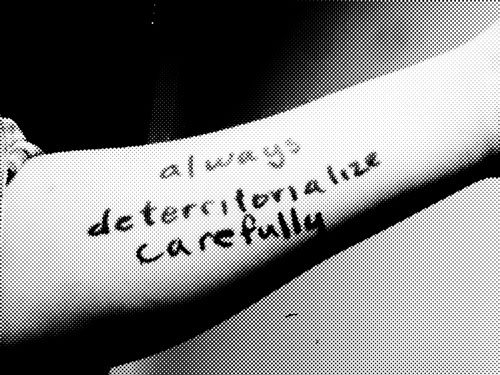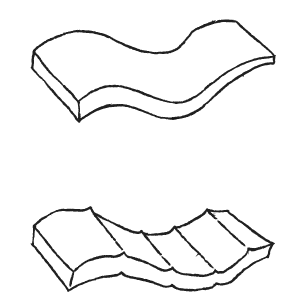
x
Contents
Home
Home
Home


Smooth and Striated Spaces
The terms territorialization/deterritorialization/ reterritorialization are complex but by no means unnecessary. In fact, they can be quite useful. My department recently underwent a reorganization of its English major in which these terms, though never mentioned, lurked behind every heated exchange. In seeking to reflect our mission statement, we wanted to encourage more courses in global and diasporic literatures. Our question was, should we create a new category from which students must take one course (thereby diluting the current traditional categories of American and British literatures) or create an overlay in which courses could be identified as also fulfilling a global or diasporic function (thereby diluting those literatures by making them mere additions to the work that is really going on in those courses). The question, which was resolved amicably, hinged on the current territorialization of the English major (which attempts to reflect the discipline at large), the ways we might deterritorialize it by introducing what Deleuze and Guattari call minor literature, and the unpredictable reterritorializations that will no doubt occur (as the minor literature infects the major or is ghettoized by it).
In reconsidering our English major, we were testing to see how smooth it was and how calcified our striations had become. The smooth/striated division Deleuze and Guattari make works through (de-/re-)territorialization but is not precisely mappable onto that set of terms. A cursory reading leads many to think of striation as bad, patriarchal, logocentric, and so on and smoothness as good, free, playful, deconstructive, postmodern, and so on. Deleuze and Guattari clearly rebuff this simple reading: “Of course, smooth spaces are not in themselves liberatory. But the struggle is changed or displaced in them, and life reconstitutes its stakes, confronts new obstacles, invents new paces, switches adversaries. Never believe that a smooth space will suffice to save us” (A Thousand Plateaus 500). Not only is smoothness not inherently good but the destratification necessary to achieve it must be pursued cautiously (160). A maxim has emerged among students of Deleuze and Guattari: “Always deterritorialize carefully.”
Within the example above, we should remember that it is never as simple as ghettoization or assimilation being either good or bad. It is more complex than that, and those are never our only choices. Wherever we find ourselves is not an eternal, essential situation but an ecology marked by contingency and malleability. As Deleuze would later write when contrasting his conception of societies of control to those regimes Foucault had previously critiqued, “There is no need to ask which is the toughest or most tolerable regime, for it's within each of them that liberating and enslaving forces confront one another. . . . There is no need to fear or hope, but only to look for new weapons” (“Postscript” 4).

“Utopia does not split off from infinite movement: etymologically it stands for absolute deterritorialization but always at the critical point at which it is connected with the present relative milieu, and especially with the forces stifled by this milieu.” (Deleuze and Guattari, What Is Philosophy? 99-100)
“Perhaps we must say that all progress is made by and in striated space, but all becoming occurs in smooth space.” (Deleuze and Guattari, A Thousand Plateaus 486)


